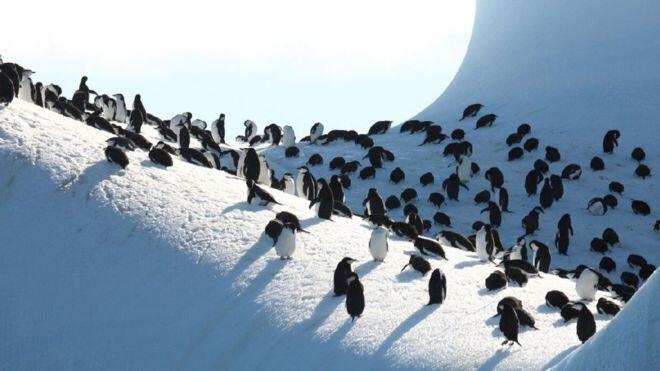Environmental groups are urging the UK to protect one of its most remote territories – the rugged, uninhabited South Sandwich Islands on the edge of the Antarctic.
The bid, by a coalition called Great British Oceans, calls for the islands to be made a sanctuary – ceasing all fishing and commercial activity.
Few people have set foot on the islands.
The group says they are some of Earth’s last wildernesses and need protection.
Scientists also suggest that, because of their location in the South Atlantic – right at the northern edge of the Antarctic, they could provide a valuable barometer for the effects of climate change in the region.
Hostile wilderness
One of the islands – Zavodovski – was captured in a dramatic sequence for the BBC’s Planet Earth 2 series, which documented the hostile environment the island’s penguins faced on a daily basis.
Simon Reddy, from Pew Bertarelli Ocean Legacy, which is leading the bid, explained that the islands were already part of a marine protected area (MPA), a conservation status that limits the amount of fishing and other human activity.
But declaring the area a sanctuary would safeguard the marine environment before climate and other threats take their toll.
“All we have around the South Sandwich Islands is one tiny fishery, so why not just declare it fully protected now,” Mr Reddy said.
“It would also mean that the islands could be set aside for science.”
The government of South Georgia and the South Sandwich Islands is currently reviewing the effectiveness of the existing conservation measures, and Dr Tom Hart, an Antarctic researcher from Oxford University who runs the PenguinWatchproject, told BBC News that it might be best to wait until that review was complete.
“The South Sandwich Islands are absolutely incredible,” Dr Hart told BBC News. “They are mountainous and usually covered in large glaciers with black or red ash folded into them like a crazy layer cake.
“They’re covered in wildlife.”
“It would be best [though] to wait for the evidence from the [MPA] review- a buffer zone may help penguins, but equally it’s possible that a higher level of protection could close the islands down and make them very difficult to monitor, which could be an own goal.”
But groups supporting the bid, including the RSPB and Greenpeace, say that keeping the islands for research will support an effort to understand the impact of climate changes in the wider Southern Ocean region stretching into Antarctica
Volcanic wildlife
Despite the hostile, jagged coasts and often violent weather, the islands appear to be a haven for wildlife.
They are home to half the world’s population of chinstrap penguins, along with a variety of seabirds and other marine life that feed in the rich seas.
Scientists believe that temperature changes there could have an impact on that marine life and the wider Antarctic ecosystem – particularly any changes in the abundance of krill, the foundation of the Antarctic marine food chain.
The islands are also formed by a volcanic arc that has created hot undersea vents that could present scientists with tiny pockets of undiscovered life in hot waters surrounded by cold seas.
While the extreme environment and remoteness make the islands difficult to study and even to reach, the organisations say “it is certain that the ecosystem is one of a kind and globally significant”.
“To preserve it, full protection from the impact of extractive activities such as fishing is essential.”
Source: http://bbc.in/2xHZwH6











